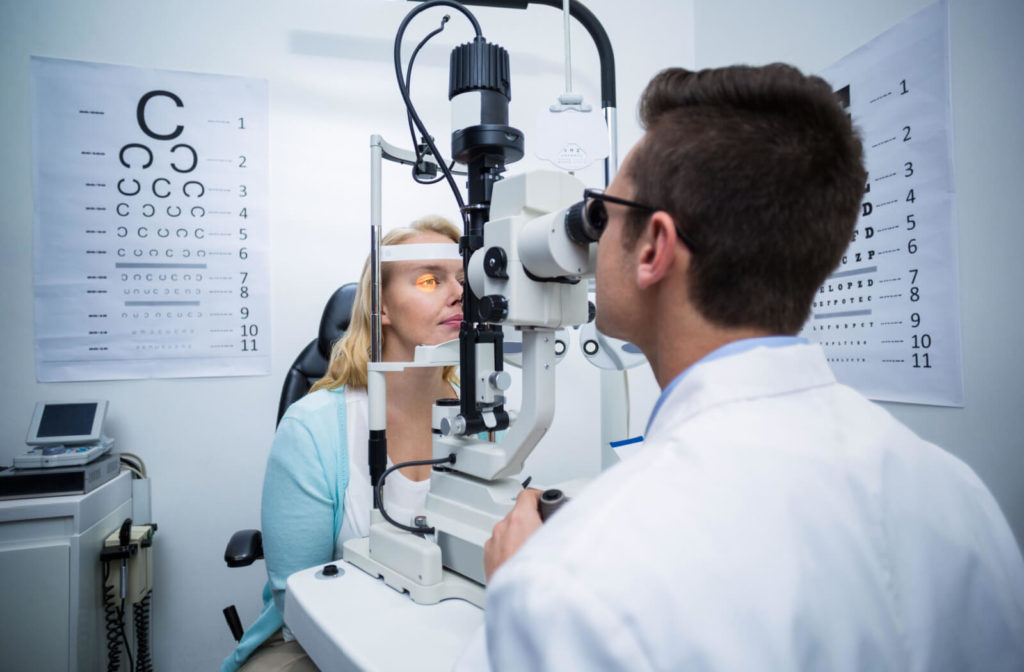When you’re trying to pay attention to something but notice tiny little specks floating across your field of view, you might be wondering if it’s something to be worried about. It can be difficult to tell if it’s a serious eye condition or just a little eye floater. And you may have asked yourself, “Can an eye doctor detect eye floaters?”
Your optometrist can see eye floaters during a comprehensive eye exam. They’ll likely dilate your pupils, which allows them to see inside your eye’s inner mechanisms. Then they’ll recommend treatment if necessary.
What Are Eye Floaters?
Eye floaters are small specks, spots, or cobweb-like shapes that drift around in your field of vision. They can be extremely distracting if you notice them. They’re actually tiny clumps of cells inside the vitreous, the clear gel-like substance that fills the inside of your eyeball. When light enters your eye, it casts a shadow on these floaters, making them visible.
These floaters vary in size and shape. Sometimes they appear like transparent dots, while other times they may seem like large noticeable strands. They’re often more visible when looking at a bright background, like a clear sky or white wall, because they obscure more of the light and cast a visible shadow.
Are Eye Floaters Dangerous?
In most cases, eye floaters are entirely harmless, and rarely need medical attention. However, this isn’t always the case. They can sometimes be an indicator of an underlying problem, causing changes within the eye.
Some conditions that can cause eye floaters include:
- Age-related changes in the vitreous
- Eye injuries or trauma
- Retinal detachment
- Inflammation in the eye
- Diabetic retinopathy
- Posterior vitreous detachment
While eye floaters themselves don’t pose a significant danger to the eyes, they can be a sign that something’s wrong—especially if you notice a sudden increase in how many floaters you’re seeing.
And if you ever notice any discomfort, pain, sudden flashes of light, or a loss of peripheral vision, seek immediate medical attention. This is a sign that something serious is occurring in the eye.
Can an Optometrist Remove Eye Floaters?
During a comprehensive eye exam, your optometrist will likely dilate your pupils. This is a temporary effect that allows more light to enter the eye, making it easier to see what’s going on inside. And while your pupils are dilated, your optometrist will be able to see floaters.
However, most of the time, eye floaters don’t require any kind of treatment. Over time, the eye’s systems can break down these cell clumps, so the floaters become less noticeable. However, in rare cases where your optometrist believes the floaters can affect your vision, health, or overall quality of life, they may recommend a process called a vitrectomy.
What Is a Vitrectomy?
A vitrectomy is an eye surgery where a surgeon removes the vitreous (the gel-like fluid) from your eye and replaces it with another solution. This surgery is typically only used in severe cases where the floaters are having a significant effect on your vision. However, this procedure does come with significant risks, so it’s rarely recommended for any but the most extreme cases.
Signs That It’s Time to Visit Your Optometrist
Eye floaters on their own are rarely a problem. However, there are several signs that indicate something more serious is occurring in your eye. These include:
- A sudden increase in the number of floaters
- Flashes of light in your peripheral vision
- Loss of peripheral vision
- Eye pain or discomfort
- Blurred vision or difficulty focusing
- Changes in your field of vision
If you experience any of these symptoms, it’s essential that you seek immediate medical attention for a thorough evaluation.
Tips for Preventive Eye Care
Taking preventative measures is a vital part of taking care of your eyes and maintaining eye health. Being proactive can allow you to detect potential issues early on, which is when most eye conditions are easier to treat.
It helps to:
- Maintain a balanced diet rich in vitamins A, C, E, and omega-3 fatty acids
- Get enough sleep
- Protect your eyes from UV rays
- Stay hydrated
- Regularly exercise
- Avoid smoking
One of the easiest ways to stay on top of your eye health is to regularly visit your optometrist for comprehensive eye exams. It’s often easier to prevent a problem than to treat one, and your optometrist can provide you with up-to-date advice about taking care of your eyes.

What to Do if You Have Eye Floaters
If you have eye floaters or any other vision concerns, come see our team at Seal Beach Eyes. Our team of experienced, caring optometrists can provide a comprehensive eye exam to help determine the right course of action. Don’t let eye floaters disrupt your day—book an appointment with our team today!



